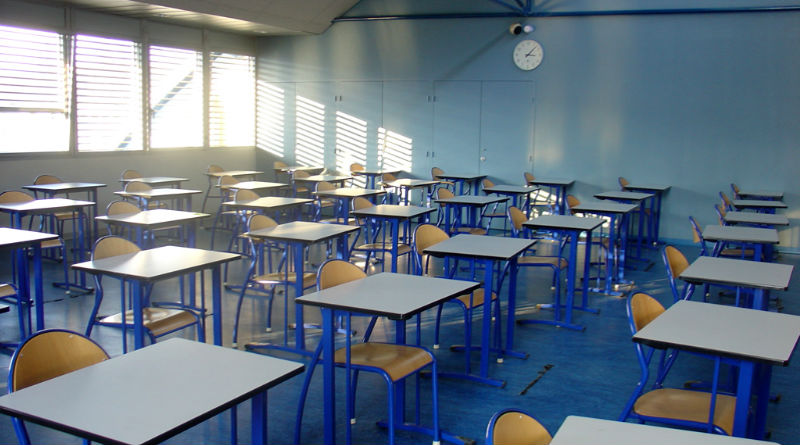
Does Your Seat Choice Say Anything About You?
Lifestyle & Opinion August 8, 2015By Nicholas J. Dortch
Day one of class and you have to pick the seat that you will sit in for the next 112 days. The classroom is your oyster, so where will you sit? You could sit close to the door so you can be the first to escape to freedom, or you can hide in the back so the teacher won’t see you texting your BFF Jill, or you could slide in next to that hottie you’ve been eyeballing. But does it matter? Does your seating choice say anything about who you are as a person?
When you think of communication, it’s natural to envision a telephone conversation with a friend or maybe a face to face discussion with a classmate. The word “communicate” literally means to impart knowledge, as if you couldn’t figure that one out, but according to Janine Driver, body language expert, a mere 7% of human communication is in the actual words coming out of your mouth. The other 93% fall under the rather large umbrella of “nonverbal.”
That’s all nice to know, but what does this have to do with classroom seating?
If nonverbal communication is anything expressed without using words, then your seating choice just might be a part of that 93%.
Let’s take a look at the Front Row:
When asked why he feels it is important to sit near the teacher, Joshua Rinard (SPC Seminole,) states “It makes me feel more secure.” This is interesting because, D. Rosing states in Research on Health and Medicine, acceptance, closeness, and security are all psychosocial needs. Physical closeness is often associated with emotional closeness. When a friend is crying, you sit next to him/her; you don’t have to say anything because you’re nonverbally saying all that you need. This is the “security” Mr. Rinard mentioned.
SPC math teacher Daniel Bueller says if a student takes a seat closer to the front, then he naturally assumes that said student will be more “assertive” than a student seated elsewhere. According to Herbert J. Walberg, students who pick seats in or near the front row (closer to the teacher) tend to be more genuine about their education. They are also more inclined to study at home than student who chooses seats in other locations.
Put simply, sitting up close and personal can show that you care.
Sitting in the front is just one of the many ways you can demonstrate you have a commitment to learning as opposed to a compulsion to escape out of a window. Willard Waller also believes the front row consist of the zealous types, however, he also expresses that the front has a good amount of overdependent attention feeders. The front row represents the center of attention, so students who thrive under the eye of authority figures are far more likely to choose these seats.
When you sit in the front, you also run the risk of being labeled as clingy. This makes sense when you think about it. The teacher’s pets are always front and center.
How About Near a Window:
The study by Walberg also says those who choose seats near a window tend to “dislike” school more frequently than students who sit in the front row. These students stated that they did not study outside of class because they “do not want to.” These students do feel disappointment when they get a question wrong on a test, but are still less inclined to look up the answers than the front row. When a teacher first sees a student with a seat near a window, they tend to be subconsciously associated with flightiness. They are always looking at butterflies and Blue Jays instead of concentrating on what the teacher is saying.
Maybe the Back:
Students who choose seats in the back of the classroom are associated with distant emotions.
It basically has the opposite effect of the front row. Because humans do not tend to allow emotionally distant people to be close to them, this conclusion is understandable. In addition to this, by choosing a seat in or near the back row, you also run the risk of being marked as an anxious introvert. Walberg’s study concludes that students who sit near the back see little value in higher education, almost never make plans to complete course work, tend to lack creativity in life, and feel they have gained the majority of their knowledge from their own observations rather than through the educational system. These students do not feel regret when they miss a question on a test and are even less willing to look up the answer on their own time.
Once again, this is not all that surprising: when you don’t care for something, you do all you can to avoid it; when you get cold you turn off the A/C, when you want to take a nap you get away from noise, and when you don’t want to learn then you stay as far away from the teacher as you possibly can, i.e. the very back of class.
So does your seat speak!?
“I don’t think that where I sit says anything about me,” says Samantha Niven, another SPC student. There are a number of ulterior reasons for you to choose the seat that you do; in the end, your hard work should overcome the unconscious thoughts your instructor might have about you.
Originally published on May 26, 2013.
Header photo by Thomas Favre-Bulle (flickr creative commons license)





